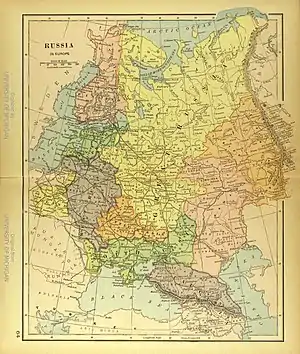
Great Russia, sometimes Great Rus' (Russian: Великая Русь, Velikaya Rus', Великая Россия, Velikaya Rossiya, Великороссия, Velikorossiya), is a name formerly applied to the territories of "Russia proper", the land that formed the core of the Grand Duchy of Moscow and later the Tsardom of Russia. This was the land to which the ethnic Russians were native and where the ethnogenesis of (Great) Russians took place. The name is said to have come from the Greek Μεγάλη Ῥωσ(σ)ία, Megálē Rhōs(s)ía,[1] used by Byzantines for the northern part of the lands of Rus'.
From 1654–1721, Russian Tsars adopted the word – their official title included the wording (literal translation): "The Sovereign of all Rus': the Great, the Little, and the White".
The term is mentioned in the opening lines of the State Anthem of the Soviet Union: "Unbreakable Union of freeborn Republics Great Russia has welded forever to stand!" (or lit. "An unbreakable union of free republics, Great Russia has sealed forever").[2]
Similarly, the terms Great Russian language (Великорусский язык, Velikorusskiy yazyk) and Great Russians (Великороссы, Velikorossy) were employed by ethnographers and linguists in the 19th century, but have since fallen out of use.
The area became, together with the Volga-Ural region, North Caucasus and Siberia, the Russian SFSR, while Little Russia and White Russia became the Ukrainian SSR and the Byelorussian SSR respectively.
See also
References
- ↑ Vasmer, Max (1986). Etymological dictionary of the Russian language. Moscow: Progress. p. 289. Archived from the original on 2011-08-15. Retrieved 2010-10-10.
- ↑ "Lyrics: The Soviet National Anthem". www.marxists.org. Retrieved 2017-10-29.